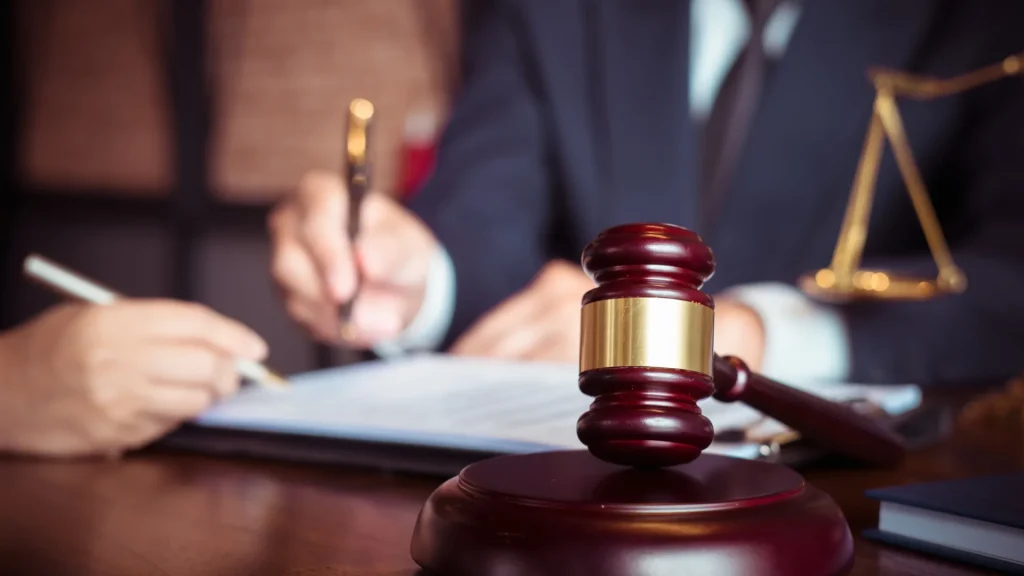When you’ve been injured due to someone else’s negligence, pursuing compensation for your losses can take two distinct paths: a settlement or a jury verdict. While both can lead to financial recovery, they represent fundamentally different outcomes in the legal process. Understanding what is the difference between jury verdicts and settlements can help you decide which path to take when an insurance company refuses to offer a fair amount for your losses.
In basic terms, a settlement is a private agreement reached between the parties, typically outside of court. A jury verdict is a decision made by a jury after hearing evidence and arguments during a full trial. Let’s review each possible resolution, highlight the factors influencing which path might be best for your case, and reveal how preparing for trial can make a substantial difference in securing the justice you deserve.
Contact Hach & Rose Today for a Free Consultation
Negotiated Settlements Provide Control, Certainty, and Confidentiality

A settlement is essentially a compromise. It’s a voluntary, binding agreement reached by the injured party (the plaintiff) and the party responsible for the injury (the defendant, usually represented by their insurance company) to resolve a legal dispute. Settlements can occur at any stage, from before a lawsuit is officially filed, throughout the discovery process, or even during a trial.
Why Settlements are Appealing
- Faster Resolution: Settlements are generally quicker than going to trial. They may be finalized in a matter of months, providing a faster route to compensation, which can be crucial for covering immediate medical bills and lost wages.
- Reduced Stress and Cost: The settlement process is typically less emotionally draining than a trial. It avoids public scrutiny, lengthy court proceedings, and intense cross-examination. Litigation costs, such as expert witness fees and court expenses, are also often lower in a settlement.
- Guaranteed Outcome: With a settlement, you know exactly how much compensation you will receive. This certainty removes the inherent risk and unpredictability of a jury trial, where the outcome is never guaranteed.
- Privacy: Most settlements are confidential. The terms of the agreement, including the compensation amount, remain private.
- Control over the Outcome: Both parties must agree to a settlement, giving them a significant degree of control over the final terms. You and your attorney can negotiate terms that best meet your specific needs, rather than leaving the decision entirely to a random jury.
Potential Downsides of Settlements
- Potentially Lower Compensation: While offering certainty, settlements sometimes result in a lower compensation amount than what a jury might award at trial, especially in cases involving severe injuries and clear liability.
- No Public Admission of Fault: Defendants typically do not admit liability in a settlement agreement. For some victims, this lack of public accountability can feel like a missed opportunity for justice.
- Finality: Once a settlement is accepted and signed, the case is closed. You generally cannot seek additional compensation later, even if new complications or expenses arise.
Jury Verdicts Provide Public Justice and Higher Potential Awards
A jury verdict is the formal decision delivered by a jury after a full court trial. It occurs when the involved parties cannot reach a mutually agreeable settlement and the dispute must be resolved by a neutral third party (the jury).
The Advantages of a Verdict
- Potential for Higher Compensation: Juries, particularly in cases involving egregious negligence or severe, life-altering injuries, have the potential to award significantly larger amounts than what might be offered in a settlement. They may compassionately consider elements like pain and suffering, as well as the long-term impact on a victim’s life.
- Public Accountability: A trial is a public process. A verdict can expose the defendant’s negligent conduct and hold them publicly accountable for their actions. For victims seeking a sense of justice and validation, a public verdict can be deeply meaningful.
- Setting Legal Precedent: While less common for individual personal injury cases, a jury verdict can sometimes influence how similar cases are viewed or even contribute to changes in laws or safety standards.
- Full Story Told: A trial allows your entire story to be presented comprehensively to a jury, detailing the full extent of your suffering and the impact of the accident on your life.
The Challenges of a Verdict
- Uncertain Outcome: Trials are inherently unpredictable. Despite strong evidence, there’s always a risk that a jury might not rule in your favor, potentially leading to no compensation at all.
- Longer Process: Going to trial significantly extends the legal timeline. Cases can drag on for months or even years, involving extensive discovery, motions, hearings, and the trial itself, delaying when you might receive compensation.
- Higher Costs: Trials are considerably more expensive than settlements. They involve substantial costs for expert witnesses, court reporters, filing fees, and extensive attorney preparation time. Even with a contingency fee arrangement, these costs will reduce the net amount you receive from a verdict.
- Emotional Stress: The courtroom process can be emotionally taxing. Testifying, facing cross-examination, and reliving the accident in a public setting can be stressful and draining for victims and their families.
- Appeals: A jury verdict is not always the final word. Either party may have the right to appeal the decision, potentially prolonging the legal process for even longer.
Why Most Personal Injury Cases Settle

Despite the potential for higher awards at trial, the vast majority of personal injury cases—as high as 95-96% nationally—are resolved through settlements before ever reaching a courtroom. This trend is driven by several factors:
- Risk Aversion: Both plaintiffs and defendants often prefer the certainty of a settlement over the unpredictable nature of a trial.
- Efficiency and Cost Savings: Settlements are generally faster and less expensive, allowing both parties to avoid the significant time and financial commitment of litigation.
- Control: A settlement gives both parties more control over the terms of the resolution compared to leaving the decision to a judge or jury.
- Privacy: The confidentiality of settlements is often appealing to both sides.
However, statistics can be misleading when applied to individual cases. The decision to settle or go to trial always depends on the unique facts and circumstances of your case.
When is Trial the Right Path? A Glimpse into Hach & Rose, LLP’s Approach
While settlement offers many advantages, there are critical situations where going to trial becomes not just an option but the necessary and best course of action. This is particularly true when an insurance company or defendant refuses to acknowledge the true value of a victim’s losses and offers an insultingly low settlement that fails to cover current and future needs.
Our firm believes that every case should be prepared as if it will go to trial. This philosophy serves a dual purpose: it demonstrates to the opposing side that we are serious and prepared to fight for full justice, and it ensures that if a fair settlement is not offered, our legal team is fully equipped to present a compelling case in court.
Recently, Hach & Rose, LLP, demonstrated the powerful impact of this trial-ready approach, securing substantial jury verdicts for four injured clients whose cases illustrate precisely why going to trial, when necessary, can lead to life-changing outcomes. In each of these cases, the insurance companies’ final settlement offers to the injured clients never exceeded $1 million, despite the devastating injuries suffered.
These recent jury verdicts were achieved by different trial teams from Hach & Rose, LLP, across various New York boroughs:
- $6 Million Verdict for a Construction Worker: This significant award was secured for a construction worker who suffered severe injuries in a ladder accident.
- $4.2 Million Verdict in a Car/Truck Accident Case: This substantial verdict was awarded to a client involved in a devastating car versus truck collision.
- $3.2 Million Verdict for a Construction Worker: This verdict compensated a construction worker who was gravely injured after being hit by a falling object on a job site.
- $1.25 Million Verdict in a Medical Malpractice Case: In this crucial case, a client suffering from medical malpractice received a significant jury award after the at-fault parties would not agree to a reasonable settlement.
The True Impact: How Clients Benefited from Larger Verdicts
These successful jury verdicts made a profound difference in the lives of the injured clients, particularly because their injuries were devastating and demanded extensive past and future medical care. For one client, a breadwinner and father of three young children, the larger verdict meant he could afford the lifelong expensive care his injuries required, securing his family’s financial future.
The trial teams presented the clients’ needs, utilizing comprehensive life care plans to explain to the jury why the awarded amounts were not just deserved, but essential. This involved engaging a range of highly qualified experts, including specialists in medical care, those who could project future expected costs, and economists who could quantify lost earning potential and other financial impacts. This expert testimony helped the juries understand the full scope of the clients’ suffering and future needs, leading to compensation that genuinely reflected their devastating injuries.
These cases stand as powerful testaments to the fact that while settlements are common, holding strong and being prepared for trial can be the only way to achieve truly just and comprehensive compensation, particularly when insurance companies undervalue legitimate severe claims.
Factors Influencing the Decision to Settle or Go to Trial

Deciding whether to accept a settlement or proceed to trial is one of the most critical choices in a personal injury case. This decision is complex and involves a careful assessment of many factors, always in close consultation with your attorney.
- Severity of Injuries and Damages: Cases involving extremely severe, permanent, or catastrophic injuries with high past and future medical costs and significant lost earning capacity are more likely to go to trial. Insurance companies are often unwilling to voluntarily pay large sums without a fight.
- Clarity of Liability: If who is at fault is crystal clear and undisputed, a settlement is more likely. If liability is contested or ambiguous, a trial may be necessary to establish fault.
- Strength of Evidence: A strong case built on compelling medical records, eyewitness testimony, accident reconstruction, and expert opinions is more likely to lead to a favorable settlement or verdict. Weak evidence increases the risk at trial.
- Insurance Company’s Strategy: Some insurance companies are known for making very low initial offers and only increasing them substantially when faced with the credible threat of a trial. Others may prefer to avoid trial due to potential negative publicity or the risk of a high jury award.
- Client’s Needs and Willingness to Take Risk: Your immediate financial needs, tolerance for stress, and willingness to accept the unpredictability of a trial all play a role. A guaranteed, albeit lower, settlement might be preferred if quick funds are essential.
- Jurisdiction: The court where the case would be tried can influence the decision. Some jurisdictions are known for more plaintiff-friendly juries, potentially encouraging trials.
Hach & Rose, LLP: Experience You Can Trust in Verdicts and Settlements
Understanding what is the difference between jury verdicts and settlements is just the first step in a complex journey. When you are severely injured, you need a legal team that not only understands these distinctions but has the proven experience and resources to confidently pursue either path, always prioritizing your best interests.
At Hach & Rose, LLP, our firm is known for its unwavering commitment to preparing every case for trial, a strategy that often compels fair settlements, but also empowers us to fight for substantial jury verdicts when insurers fail to act reasonably. Our attorneys have nearly 25 years of experience, securing over one billion dollars in compensation for injured New Yorkers. We believe in providing sound, honest legal representation, tirelessly fighting for the justice and compensation you truly deserve.
Don’t settle for less than your case is worth. If you or a loved one has suffered a severe injury due to negligence, contact Hach & Rose, LLP, today for a free and confidential consultation. Call us at (212) 779-0057 or complete our online contact form. We work on a contingency fee basis – no fees unless we win.